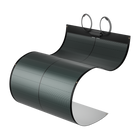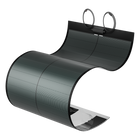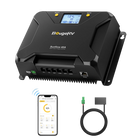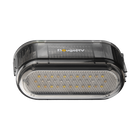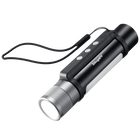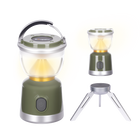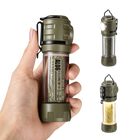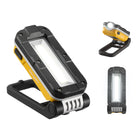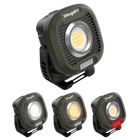The Cost of RV Living: A Guide to Budget-Friendly RV Life

RV living, more commonly known on social media as “van life”, has grown increasingly popular in recent years, offering the allure of freedom, adventure, and a minimalist lifestyle. However, the cost of RV living can vary widely depending on factors like the type of RV, lifestyle choices, and travel habits. Whether you're considering moving to full-time RV life or just want to cut costs during extended road trips, understanding the financial aspects is key. Let’s explore the real cost of RV living and some practical ways to keep expenses low.
Breaking Down the Costs of RV Living
Several factors need to be considered when you’re thinking about RV life. These include the actual cost of the RV, the cost of campgrounds for parking, the cost of fuel, RV maintenance and utilities, and food and entertainment costs.
Purchasing or Renting an RV
One of the largest expenses in RV living is the RV itself. Costs vary significantly depending on the type, size, and condition. Buying an RV can range from $10,000 for a used travel trailer to over $300,000 for high-end motorhomes. Financing options can spread out payments, with monthly costs typically running between $200 and $1,000.
Renting an RV, on the other hand, is a more economical choice for short-term travelers. Daily rental rates generally fall between $50 and $250, depending on the season and RV type. For those aiming to reduce their initial investment, purchasing a used RV is a smart move, but it’s important to inspect it thoroughly to avoid expensive repairs down the road.
Campground Fees
Where you choose to park your RV can have a big impact on your monthly expenses. Luxury RV resorts with full hookups, pools, and Wi-Fi can cost $50 to $100 per night. Public campgrounds, such as those managed by state or national parks, are more affordable, typically charging $10 to $30 per night.
For those looking to minimize costs further, boondocking—or camping for free on public lands—offers a budget-friendly option. However, it may require more planning and investments in off-grid equipment like solar panels and portable power stations.

Fuel Costs
Fuel is one of the most variable expenses in RV living. Motorhomes typically achieve 8–15 miles per gallon, so fuel costs can add up quickly if you frequently travel long distances. Slowing down, planning efficient routes, and traveling less often can all help reduce fuel expenses.
Utilities and Maintenance
Utility expenses for RV living include propane for heating and cooking, which costs about $20–$50 per refill, and electricity, which is often included in campground fees. If you rely on a generator, fuel costs can add up as well.
Maintenance is another ongoing cost. Routine tasks like oil changes, tire replacements, and system checks typically run around $1,000 per year. Repairs, especially for older RVs, can be more expensive, so it’s wise to set aside an emergency fund.
Food and Supplies
Grocery costs for RV living are similar to stationary living, but dining out while on the road can quickly become expensive. Cooking in your RV can save money and provide healthier meal options. Investing in a portable fridge, such as those from BougeRV’s 12V Refrigerator range, can help you store fresh food and reduce grocery trips.

Tips for Lowering RV Living Costs
While the costs of RV living may seem daunting, there are ways to cut down bills so that you get the most out of your van life adventure.
Invest in Energy Independence
Electricity can be a significant cost, particularly for those who park in areas that do not have access to camping facilities. Renewable energy solutions, like solar panels and portable power stations, can reduce long-term expenses.
BougeRV offers a wide range of flexible solar panels that are lightweight, easy to install, and ideal for off-grid living. In addition to this a portable power station may come in handy, BougeRV boasts easy-to-use and affordable options that store energy for powering appliances, reducing reliance on costly generators.

Embrace Minimalism
With limited space in an RV, adopting a minimalist mindset is not just practical but also cost-effective. Fewer possessions mean less money spent upfront and fewer items to replace over time. Multi-functional tools, compact appliances, and durable gear are invaluable.
Leverage Memberships and Discounts
RV memberships, such as Passport America or Good Sam Club, can significantly reduce costs. These programs offer discounts on campgrounds, fuel, and repairs. For frequent visitors to state or national parks, annual passes can also provide excellent value.
Learn Basic Maintenance
Performing simple maintenance tasks yourself can save hundreds of dollars annually. Skills like checking tire pressure, changing filters, and sealing leaks are easy to learn and can prevent costly breakdowns.
FAQs About RV Living Costs
Is RV living cheaper than renting a home?
In many cases, yes. RV living can be more affordable than traditional housing, especially if you own your RV outright and utilize free or low-cost camping options. However, frequent travel and stays at luxury RV parks can increase expenses.
How much does it cost to outfit an RV for full-time living?
Outfitting your RV can cost between $1,000 and $10,000, depending on your needs. Essential investments might include solar panels, a portable fridge, and comfortable furniture.
Can you live in an RV year-round?
Yes, but year-round RV living requires preparation. Insulate your RV for cold climates and ensure your air conditioning system is functional for hot weather. Solar panels and portable power stations can help offset seasonal utility costs.
How can I save on fuel costs?
To save on fuel, travel less frequently and plan efficient routes. Apps like GasBuddy can help you find the cheapest fuel prices. Additionally, driving at steady speeds and avoiding unnecessary weight in your RV can improve fuel economy.
What are some hidden costs of RV living?
Hidden costs include insurance, registration fees, and storage fees if you need to park your RV during off-seasons. Unforeseen repairs and upgrades can also add to expenses, making an emergency fund essential.


















